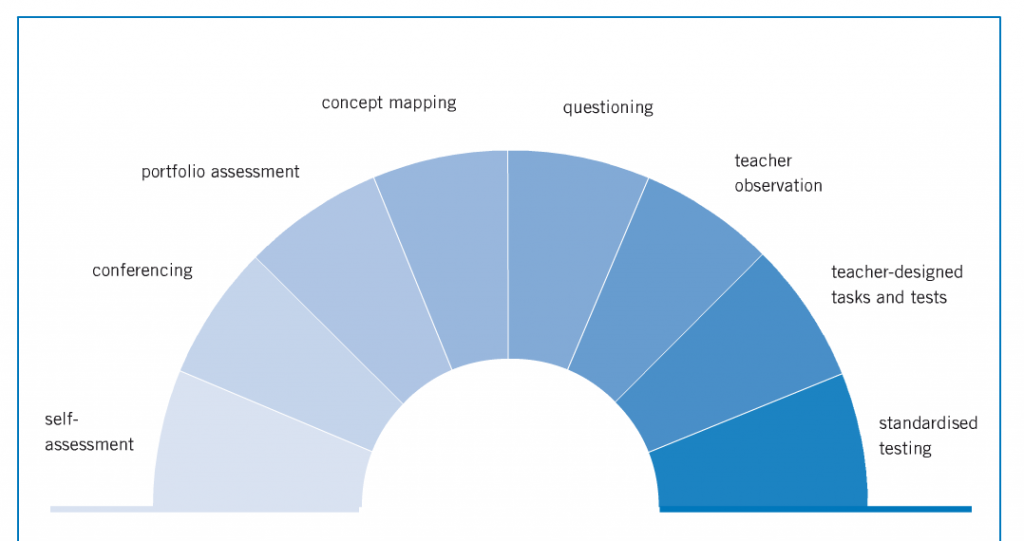I really don’t like that time of year… the time of year for school reports; when we, educators, award numerical values to our students and their learning and subsequently submit these scores on report cards to children’s parents.
Here in Ireland, we have some great report cards available to us from NCCA, which allow us to report on the child as a learner, on their social and personal development, their learning during the year and on how parents can support the child’s learning. There is a section where the students write up about their own reflections on their learning for the year. I believe that these are all very positive approaches towards a holistic and healthy assessment and reporting process.
However, there is a section on these same report cards where the child’s standardised assessment scores must be included. And while standardised assessments are useful and informative, they are now gaining an importance in the lives of children and their parents, that is, somewhat less than helpful.
That standardised score is often the first thing that students and parents seek on end-of-year report cards and it is also frequently, the only part they remember about their report card. What happens, in essence, is that the richness of all the learning, exploring, creating and experimenting that children have experienced throughout the school year, is forgotten and the whole year’s learning is reduced to a single, stark number: the standardised score. For children and their parents, these numbers are gradually becoming not only an icon of how well they are doing at school, but are now becoming indicators of the educational value of the child themselves.

(from Classroom Assessment Methods (p. 13) in the NCCA Assessment Guidelines for Schools)
Although NCCA recommend that we use a range of assessment methods to complement the test score (see guidelines above), the sad truth is that the score and its value, in the eyes of both students and parents, become the ultimate evaluation of the students’ lives in education. Children learn quickly that their status in the education system is fairly non-existent, unless they are skilled at Maths and Literacy and achieve high scores in these areas.
I wonder what impact this commodification of learning will have on our children in years to come?
Will the students who score STen 3 perceive themselves as failures? Will the ’10’s’ feel pressurised to keep their scores high? Where and when do creativity and critical thinking happen in an education system that is focussed solely on test scores? What anxieties will arise in homes where scores have dropped from an 8 to a 6?
What do these scores say about what we value in schools? Let us bear in mind Postman’s warning: ‘If a number can be given to the quality of a thought’, he argues (1993, p.13), ‘then a number can be given to the qualities of mercy, love, hate, beauty, creativity, intelligence, even sanity itself’.
What do children who continuously score below Sten 4 learn about themselves? And what impact will that have their lives as they become teenagers and adults? What impact will it have on society and how people perceive themselves and other people?
Will artists, dancers, creators, poets, dreamers and musicians cease to exist? Do we want to create a society bereft of dance?
What do you think?

what we value as teachers and what the system values are two entirely different things right now. testing is becoming more and more important and with submission of results to department there’s even more pressure on teachers to be “producing the goods”. I recently saw a table published in the newspapers of Irelands top secondary schools based on leaving cert points. sad thing is that the points don’t tell the full story. but this is the kind of thing required by the media and by some members of society. it would be very disappointing if the same was to happen at primary level.
I agree, Siobhan, that it would be a retrograde step if a school’s contribution to teaching and learning were to be judged on the achievement of its pupils on standardised tests. As teachers committed to the holistic development of our pupils, we should resist at every opportunity the commodification of our educational system. Otherwise, we may end up with a ‘pay by results’ situation, which would be detrimental to the idea of democracy in educational terms. As you point out, Siobhan, there appears to be a clash of values between what teachers believe are important in fulfilling the needs of their pupils and what the DES seems to suggest as desired outcomes for schools. Perhaps it is time for teachers to stand firm and demonstrate that their educational values are legitimate and have at their core the interests and wellbeing of their pupils.
I am coming to this conversation late, and as a ‘blow-in’ from New Zealand (arrived April). While I work in a university, I am primary teacher trained and I heartily endorse the concerns mentioned above.
The National government in New Zealand introduced National Standards in primary schools around a decade back. Primary teachers and their union staunchly resisted this but the might of the government was brought to bear and they were forced to comply. Some teachers and principals are still, to my knowledge, subversively refusing to include standardised test results, believing that these will be used to categorise students and schools in a most unhelpful way.
I think you are very wise to resist this imposition in Ireland. Education is way more than the sum total of ‘currently favoured subjects’.